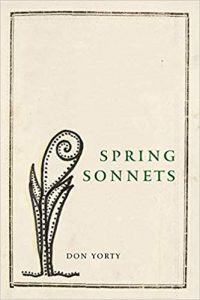“Spring Sonnets” by Don Yorty
by Scott Hightower · October 23, 2019 (Indolent Books, 978-1-945023-22-4, 2019, $19.99)
(Indolent Books, 978-1-945023-22-4, 2019, $19.99)
Don Yorty notes that he started writing a large set of sonnets shortly after the invasion of Iraq in 2003. They span seven springs.
None are titled or broken into stanzas. All are fourteen carefully measured, unrhyming pentameter lines, each an elegant block of blank verse. “Elegance” is using the least to get the most out of it.
The opening poem is a love poem which evokes fellow poet, the late Bill Kushner. The central metaphor—in the metaphysical poetic tradition—is a tick.
Springs, streams, rain, spilt dribble, seasons, voices, empathy for others, sympathy for fellow creatures, love for the broken creatures of the world all wind their way through this cascade of sonnets. Creatures wind their way through urban green spaces. The poet walks in cherished landscapes.
The landscapes are peopled with enemies, strangers, and friends. There are anarchists, former lovers, criminals, ghosts, lousy and loving neighbors in the mix. Notably absent is fear. Notably absent is malice. Is this the velvet hammer revolution of love? There is a warm kitchen, an abiding sense of eroticism, and the cycling of jobs; a cat named Cachito and the ever real backdrop of the city of New York. Some pastoral settings also make their way into the series.
The ever-rewarding practice of writing and compiling observations yields a beautiful collection of sonnets in the English tradition. Large abstractions and diurnal concrete life artfully bring the reader to poetic existentialism. Or is it something warmly fitting and more familiar? American Transcendentalism with touches of Baudelarian surrealism:
… “Love’s the word I strive to say
to you, believing it the place where striving
ceases, there pain ends, and even the best
of words. Love we’ll remember after death.”
(Sonnet #28)
The beautiful drawings of Ahm Akram are a perfect complement. One only wants to read more. One only wants to see more. One hundred eighty sonnets is but half a circle. We can only hope for another one hundred eighty, full revolution.
